Key takeaways:
- Telecom data privacy is essential for protecting personal information from potential misuse, and consumers need to be aware of how their data is collected and shared.
- Robust privacy policies build trust between consumers and telecom providers, encouraging responsible usage and fostering loyalty.
- Regulatory frameworks like GDPR and CCPA are crucial for setting high standards for data protection, though challenges in enforcement and technology adaptation remain.
- The future of telecom data privacy hinges on empowering consumers with control over their information while ensuring regulatory measures evolve alongside technological advancements.
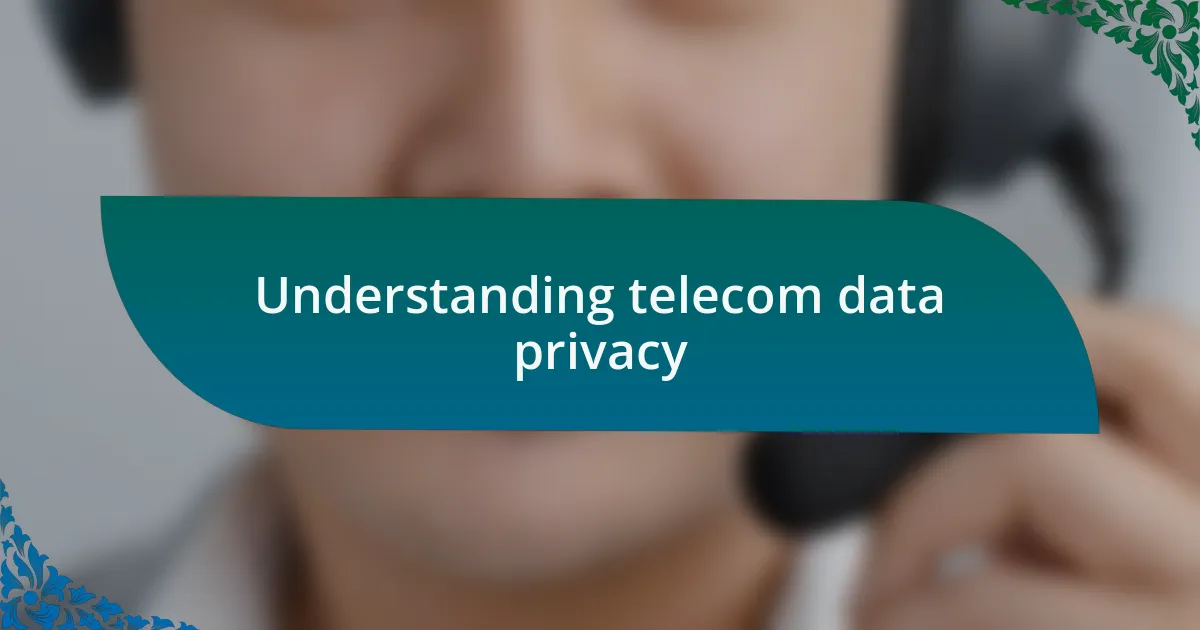
Understanding telecom data privacy
Telecom data privacy is about how our personal information is handled by service providers. I remember the first time I received a message from my carrier detailing how they track my usage and location. It made me wonder: how much of my data is truly secure, and who else has access to it?
Privacy policies can often feel like a maze, filled with legal jargon that can be overwhelming. I’ve spent countless hours trying to decipher these documents, only to find that basic protections for my data are often buried deep within them. This experience left me frustrated and questioning the safeguards in place—are we as consumers genuinely aware of what we’re consenting to?
It’s crucial for consumers to understand the implications of data sharing. I often ask myself, do we really grasp the data trail we leave behind daily? This question resonates deeply as I consider how telecom companies handle sensitive information—knowing that a simple phone call or text could reveal much about my life makes me crave transparency and control over my own data.
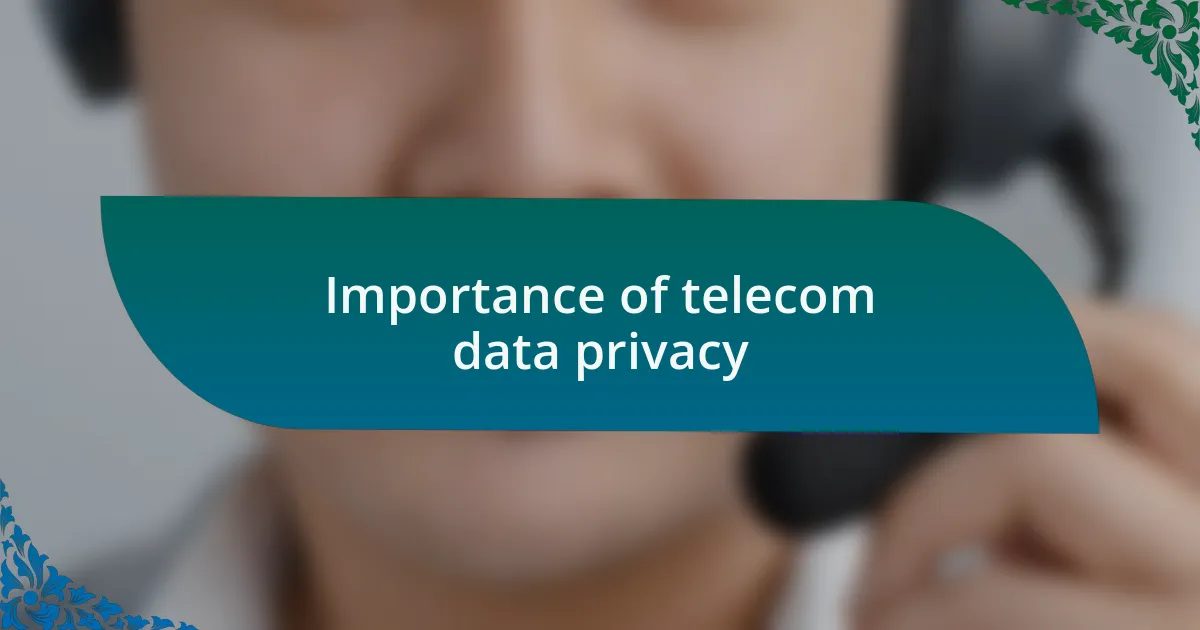
Importance of telecom data privacy
The importance of telecom data privacy cannot be overstated. When I think about all the information I share daily, from call logs to location data, it makes me realize how vulnerable I could be if that data fell into the wrong hands. Privacy isn’t just a luxury; it’s a necessity for ensuring that our personal lives remain private.
I once had a friend who became a victim of identity theft after his telecom data was compromised. The emotional and financial toll it took on him was staggering. This experience highlights that without robust telecom privacy measures, our data can be exploited in ways we never anticipated. How can we feel safe when using technology that, at its core, is meant to connect us?
Moreover, a strong telecom data privacy policy builds trust between consumers and service providers. I often reflect on how my perception of a company shifts when I know they prioritize my privacy. It fosters loyalty and encourages responsible usage of technology, benefiting both users and providers alike. Isn’t it reassuring to think that our data can be safeguarded, allowing us to navigate the digital landscape with confidence?
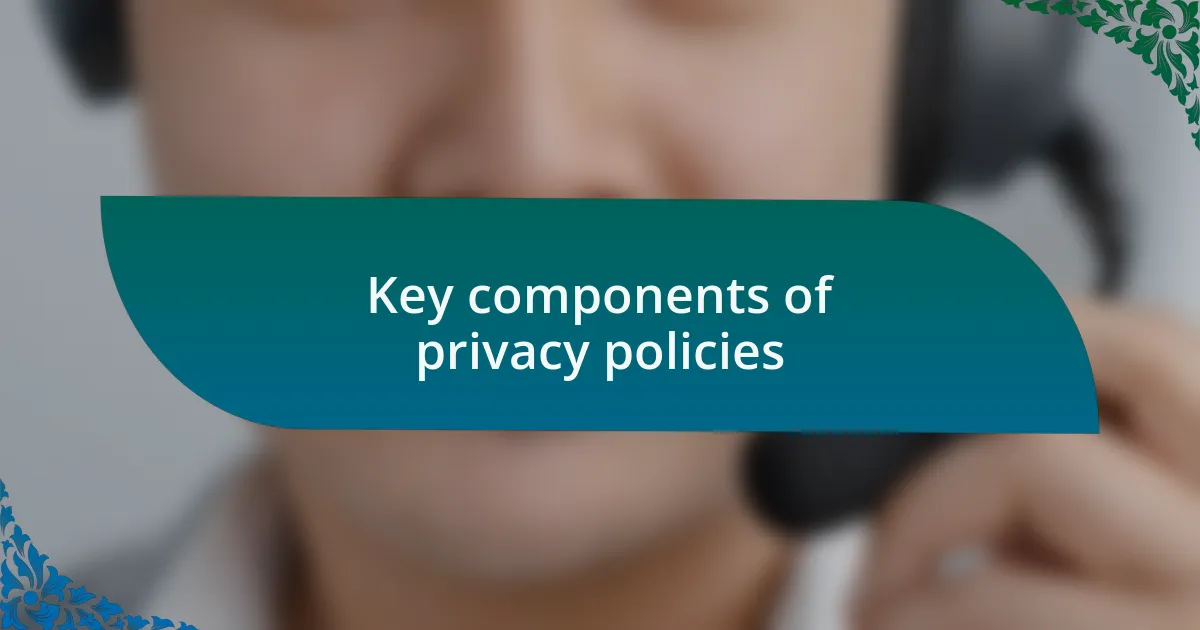
Key components of privacy policies
Privacy policies in the telecom industry typically focus on key components such as data collection practices, user consent, and retention timelines. I still remember the moment when I first read a privacy policy that clearly outlined what data they collected. It made me feel a sense of reassurance, like I was being respected as a customer rather than just a data point.
Another critical aspect is how the policy addresses data sharing with third parties. I once encountered a situation where a telecom provider shared my information with a marketing firm without my explicit consent. That experience left me feeling exposed and questioning the transparency of their practices. It’s crucial for these policies to specify who has access to our data and under what circumstances.
Finally, the ability for users to manage their privacy settings is essential. There’s nothing more empowering than knowing I have control over my own information. I recall using a telecom service that allowed me to easily update my privacy preferences, which fostered a sense of autonomy. Isn’t it nice to feel like we have a say in our digital lives?
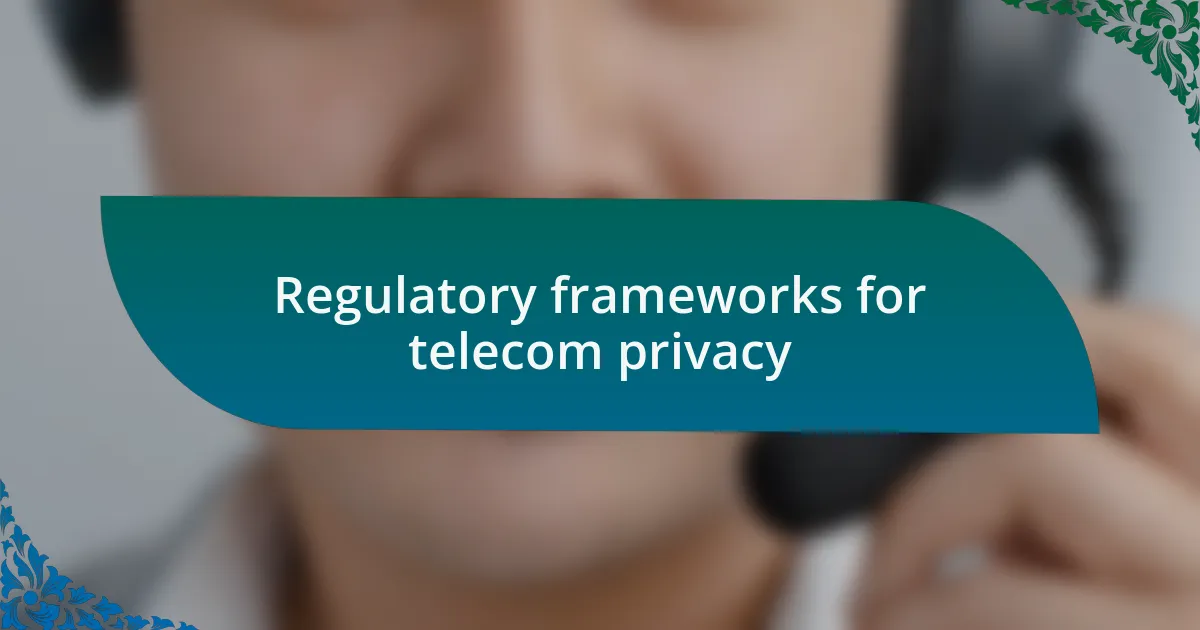
Regulatory frameworks for telecom privacy
Regulatory frameworks for telecom privacy have evolved significantly to keep pace with technological advancements. For example, the General Data Protection Regulation (GDPR) in Europe has set a high standard for data protection, requiring telecom companies to be transparent about their data practices. I can’t help but appreciate how these regulations push companies to prioritize user consent, making it clear that our personal information isn’t something to be taken lightly.
In the United States, frameworks like the Communications Act and various state laws establish guidelines for data privacy in telecom. I remember reading about the California Consumer Privacy Act (CCPA) and thinking how it empowers Californians to better understand and control their personal data. Do you ever wonder how different the telecom landscape would look if similar laws were implemented nationwide?
It’s also fascinating to observe regional differences in how privacy is handled. While some countries have strict regulations, others operate in a more lenient environment. Reflecting on this, I feel a sense of urgency for broader global standards that safeguard user data universally. What would it take to truly harmonize these frameworks and ensure everyone’s privacy is respected, regardless of where they live?

Personal experiences with data privacy
Navigating data privacy has often felt like walking a tightrope for me. I once discovered, almost by accident, that my mobile provider was using my data for targeted advertising without my explicit consent. That moment left me feeling exposed and questioning how many other aspects of my privacy were at risk. Isn’t it unsettling to think that our daily online choices can be influenced by data we didn’t even agree to share?
On another occasion, I decided to review the privacy settings on my telecom account. As I sifted through the options, a wave of anxiety washed over me—how many permissions had I granted without fully understanding the implications? This experience was eye-opening; it made me realize that many users, like me, often overlook these details. Shouldn’t we all be more proactive in securing our privacy to avoid potential pitfalls?
I still recall a conversation I had with a friend who works in cybersecurity. She shared a story about a major data breach affecting several telecom customers. Hearing her describe the widespread consequences made me more aware of just how interconnected our lives are through our devices. It leaves me wondering: how can we better prepare ourselves and advocate for stronger data privacy measures in the telecom industry?
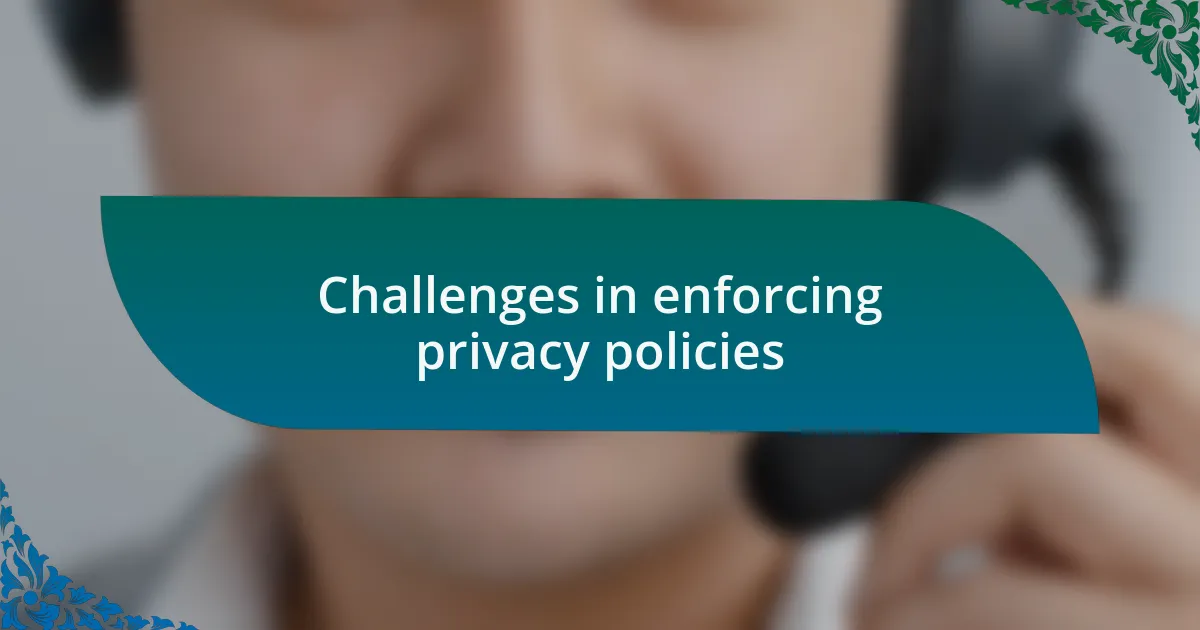
Challenges in enforcing privacy policies
Enforcing privacy policies in the telecom sector often feels like trying to catch smoke with my bare hands. For instance, I remember a time when I encountered a vague privacy policy on my telecom provider’s website, filled with legal jargon. It left me wondering, how could anyone expect a consumer to truly understand what they were agreeing to? This complexity creates a significant barrier to informed consent and ultimately dilutes the effectiveness of any privacy policy.
Another pressing challenge is the ever-evolving landscape of technology. I recently noticed that my telecom provider rolled out new features using advanced algorithms for data analysis. While these innovations might enhance service, they also raise a question: how can companies adapt their privacy policies swiftly enough to keep pace with such rapid changes? This struggle to align technology with privacy regulations often leads to loopholes that can compromise user data.
Finally, it’s crucial to consider the lack of accountability in enforcing these policies. During a chat with another friend who works as a compliance officer, she recounted how her team frequently faced pushback when trying to implement stronger privacy controls. It made me reflect on whether telecom companies genuinely prioritize customer privacy or if compliance is merely a box to tick. Isn’t it time we demand more transparency and trust from the companies that hold our personal data?

Future of telecom data privacy
As I ponder the future of telecom data privacy, I can’t help but feel a sense of urgency. Imagine a world where telecom companies not only prioritize our data security but also empower us with tools to control our own information. This shift could redefine our relationship with service providers, fostering trust and ensuring that we are informed participants in our own privacy journeys.
However, I also recognize the challenges that lie ahead. In my conversations with industry experts, it’s clear that integrating advanced technologies, such as artificial intelligence and blockchain, into privacy practices can be a double-edged sword. These advancements hold the promise of better security, yet they can also complicate our understanding of privacy policy implications. How can we expect consumers to navigate this complex landscape without proper guidance and education?
Additionally, I often wonder about the role of regulation in shaping our data privacy future. Reflecting on recent regulatory efforts, I see a mixed bag of progress. There are encouraging signs that policy makers are starting to take privacy seriously, but will it be enough to keep pace with technological advancements? I believe we must advocate for proactive regulations that not only protect us but encourage transparency in how our data is used and shared. What are your thoughts on how we can bridge this gap?